Man Martin's Blog, page 103
May 18, 2015
Presidential Losers #8: John Quincy Adams
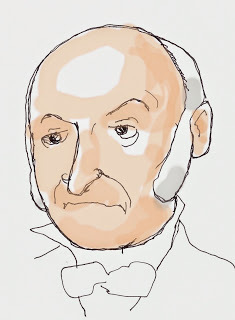 1820 was still awash in the Era of Good Feelings. Isn’t that a great name? Wouldn’t you like to live in the Era of Good Feelings instead of the Me Generation or the Decade of Greed?
1820 was still awash in the Era of Good Feelings. Isn’t that a great name? Wouldn’t you like to live in the Era of Good Feelings instead of the Me Generation or the Decade of Greed?All Federalist opposition had evaporated and James Monroe ran unopposed. He just said, “I think I’d like being president,” and the whole country said, “Okey-doke.” The whole country except one rogue elector named William Plumer who cast his vote for John Quincy Adams, the son of Presidential loser #3, John Adams.
The popular legend is Plumer dissented because he felt only George Washington deserved the honor of a unanimous election, which is just the sort of rumor you’d expect to go around during the Era of Good Feelings. (Doesn’t that story just make you feel good?)
The truth is, Plumer just didn’t like Monroe: casting one useless vote for Adams was like serving someone a seven-course meal and spitting in the appetizer.
Plumer, founder of the New Hampshire Historical Society and author of over a dozen books, including such page-turning classics as The Substance of an Argument Against the Indiscriminate Incorporation of Churches and Religious Societies, and Young Children May Be Truly Pious, inveighed against the “wasteful extravagance” of the previous Monroe administration.
This probably had to do with the wasteful and extravagant way Monroe kept admitting states to the Union – five over two terms as president – diluting the political power of tiny New Hampshire. Get over it, New Hampshire, you still have the Primary.
Plumer saw to it that fellow New Englander John Quincy Adams would go down in history as the biggest loser up to that time in a presidential elections.
Result
James Monroe: 230John Quincy Adams: 1
(In fairness, some people maintain Adams did not really lose by the whopping 229 electoral votes shown here because the votes from the new state of Missouri might not have been valid. In that case, Monroe would have squeaked by with a mere 226-vote margin.)
Published on May 18, 2015 03:44
May 17, 2015
Spencer's Wedding
 Yesterday, my younger daughter Spencer tied the knot with Glenn Stewart.
Yesterday, my younger daughter Spencer tied the knot with Glenn Stewart.If I say so myself, it was a complete success. I personally embarrassed my daughter three times by my count, which is the requisite minimum number for a self-respecting dad to embarrass his daughter.
Let's face it, the 21st Century American wedding has gotten completely out of hand. This wedding was no exception. There was a regular battalion of bridesmaids and groomsmen. Lined up at the altar, they looked like the finale of a Gilbert and Sullivan operetta.
The rehearsal dinner was at a magnificent old home, the ceremony was beautifully conducted at St Martins in the Fields by Father John McCard, and afterwards, there was a reception at a swanky country club. This morning, there was a wonderful breakfast.
It was a complete blowout.
Yes, the modern American wedding is an insane extravagance, but - to reiterate - this morning my daughter is married to the man she has chosen to spend the rest of her life with. And he is a wonderful man.
There are worse reasons for extravagance.
Published on May 17, 2015 15:31
May 16, 2015
Presidential Losers #7: Rufus King
 By 1816, the Federalists were in such disarray, they couldn’t even summon the organizational gumption to hold a caucus, so Rufus King, two-timer loser for VP, became the default candidate for anybody who just didn’t want to vote for Monroe.
By 1816, the Federalists were in such disarray, they couldn’t even summon the organizational gumption to hold a caucus, so Rufus King, two-timer loser for VP, became the default candidate for anybody who just didn’t want to vote for Monroe. Too bad for Rufus, there weren't many of these people, because this was the Era of Good Feelings, a strange thing since The War of 1812 had been pretty much a disaster for the US.
Both sides claimed victory, but the British had burned Washington and forced the president to flee for his life, and if war is a matter of keeping score, the Americans lost about 2,200 lives, and the British only lost about 1,600.
We did get some great songs out of the war: a lawyer named Francis Scott Key was inspired to compose a poem about the bombardment of Ft McHenry, 1 and the Battle of New Orleans inspired a pop tune by the same name in the 20th Century. To be fair, the Battle of New Orleans was fought in extra innings since peace had already broken out, but it still elevated the stature of Andrew Jackson, and – as I have said earlier – made for a great song.
But even if the War of 1812 ended in a tie, folks were pretty content with the way things stood, so all in all, poor Rufus never had a chance.
The Result
James Monroe: 183Rufus King: 34
1. The title of the poem was "The Defense of Fort McHenry," and it was later given the (much better) name of "The Star Spangled Banner" and set to an unsingable melody to become our national anthem. Every schoolchild knows the melody was originally a British drinking song, but what they don't know is what an unendurably lame drinking song. The lyrics in part run thus:
To Anacreon in heaven where he sat in full glee,A few sons of harmony sent a petition,
That he their inspirer and patron would be,
When this answer arrived from the jolly old Grecian:
Voice, fiddle aud flute, no longer be mute,
I'll lend you my name and inspire you to boot!
And besides I'll instruct you like me to entwine
The myrtle of Venus and Bacchus's vine.
Published on May 16, 2015 04:19
May 15, 2015
Presidential Losers #6: DeWitt Clinton
Anybody can be a success, but it takes real guts to be a failure. Here is a series of all those who vied for the top office in our land. And lost.
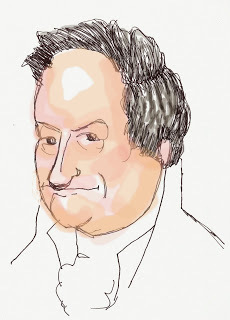 After two blow-outs against Charles Cotesworth Pinckney, the Democratic-Republican Party found tougher opposition against Dewitt Clinton. Jame Madison, the incumbent, must’ve felt a little piqued that DeWitt was the nephew of his own former Veep, George Clinton.
After two blow-outs against Charles Cotesworth Pinckney, the Democratic-Republican Party found tougher opposition against Dewitt Clinton. Jame Madison, the incumbent, must’ve felt a little piqued that DeWitt was the nephew of his own former Veep, George Clinton.
Wikipedia says DeWitt Clinton was a Federalist, but that’s just silly talk. Clinton was a Clintonian, an ad hoc party slapped together by Madison’s enemies. DeWitt was nominated by a rogue caucus (rogue caucus – there’s a pair of words you never see together) of Democratic-Republicans who were upset because Madison dragged his feet getting us into the War of 1812. (This accusation was completely unfair; I checked the facts, and the War of 1812 started right on schedule.)
I cannot express how sad I find it that we never had a DeWitt in the White House, but that’s the way it is. We had our chance at a Cotesworth and a Rufus, too, and we blew it then as well.
Result
James Madison: 128DeWitt Clinton: 88
 After two blow-outs against Charles Cotesworth Pinckney, the Democratic-Republican Party found tougher opposition against Dewitt Clinton. Jame Madison, the incumbent, must’ve felt a little piqued that DeWitt was the nephew of his own former Veep, George Clinton.
After two blow-outs against Charles Cotesworth Pinckney, the Democratic-Republican Party found tougher opposition against Dewitt Clinton. Jame Madison, the incumbent, must’ve felt a little piqued that DeWitt was the nephew of his own former Veep, George Clinton. Wikipedia says DeWitt Clinton was a Federalist, but that’s just silly talk. Clinton was a Clintonian, an ad hoc party slapped together by Madison’s enemies. DeWitt was nominated by a rogue caucus (rogue caucus – there’s a pair of words you never see together) of Democratic-Republicans who were upset because Madison dragged his feet getting us into the War of 1812. (This accusation was completely unfair; I checked the facts, and the War of 1812 started right on schedule.)
I cannot express how sad I find it that we never had a DeWitt in the White House, but that’s the way it is. We had our chance at a Cotesworth and a Rufus, too, and we blew it then as well.
Result
James Madison: 128DeWitt Clinton: 88
Published on May 15, 2015 03:34
May 14, 2015
Presidential Losers #5: Charles Cotesworth Pinckney Again
What patriotic heart does not beat just a little faster at the mention of those immortals who led this great nation of ours: Garfield, Polk, Taylor. But what of the also-rans, the near-misses, and wannabes? In short, what of the losers? This blog shall honor those who sought the laurel of leadership, but won only the cabbage of loser-ship.
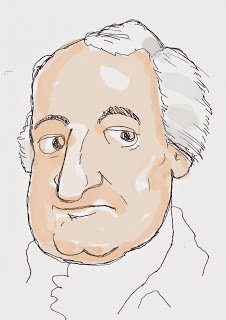 One thing you can say about Ol’ Pinckney: he was no quitter. He lost in big in 1804, and by golly, he came right back in 1808 and lost big again.
One thing you can say about Ol’ Pinckney: he was no quitter. He lost in big in 1804, and by golly, he came right back in 1808 and lost big again.
He even stuck with his same running mate, determined that someone named Rufus would be in the executive branch.
He didn’t lose quite as big this time; he was helped by a trade embargo that had pissed off the New England States. Also, the Democratic-Republican candidate James Madison wasn’t quite the superstar Jefferson had been.
Pinckney never ran again, I’m sorry to say. But… on July 4, 1726 – precisely half a century after the signing of the Declaration of Independence – former presidents, long-time rivals, and founding fathers, John Adams and Thomas Jefferson both died, neither one probably aware that Charles Cotesworth Pinckney had also died, exactly eleven months and nineteen days earlier: August 1, 1825! Coincidence? I’ll let you decide.
Results
James Madison: 122Charles Cotesworth Pinckney: 47
 One thing you can say about Ol’ Pinckney: he was no quitter. He lost in big in 1804, and by golly, he came right back in 1808 and lost big again.
One thing you can say about Ol’ Pinckney: he was no quitter. He lost in big in 1804, and by golly, he came right back in 1808 and lost big again. He even stuck with his same running mate, determined that someone named Rufus would be in the executive branch.
He didn’t lose quite as big this time; he was helped by a trade embargo that had pissed off the New England States. Also, the Democratic-Republican candidate James Madison wasn’t quite the superstar Jefferson had been.
Pinckney never ran again, I’m sorry to say. But… on July 4, 1726 – precisely half a century after the signing of the Declaration of Independence – former presidents, long-time rivals, and founding fathers, John Adams and Thomas Jefferson both died, neither one probably aware that Charles Cotesworth Pinckney had also died, exactly eleven months and nineteen days earlier: August 1, 1825! Coincidence? I’ll let you decide.
Results
James Madison: 122Charles Cotesworth Pinckney: 47
Published on May 14, 2015 03:13
May 13, 2015
Presidential Losers #4: Charles Cotesworth Pinckney
Every schoolchild can recite with glowing eyes the noble deeds of Franklin Pierce and - what's his name - Buchanan or something. But who remembers the losers? This blog will rescue them from their deep obscurity into somewhat shallower obscurity.
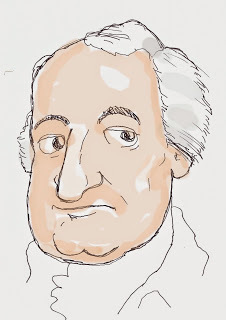 After two acrimonious, partisan, edge-of-your seat elections, the US needed someone to ensure a good yawn-inducing
After two acrimonious, partisan, edge-of-your seat elections, the US needed someone to ensure a good yawn-inducing
campaign, and Pinckney was the man for the job.
Somehow even his impressive record as a general and prisoner of war during the American Revolution wasn’t enough to engender excitement. (Of course it didn't help to be running against the author of the Declaration of Independence.) Even the name: Pinckney. It not only sounds funny, it’s one of those names that after you write it, you have to go back and check your spelling. Which explains why his parents named him Cotesworth. They probably figured, "Hell, his last name is already Pinckney. We can't make it any worse."
His running mate was even better: Rufus King of New York. Why can’t we have someone named Rufus in the executive branch?
It would not be strictly accurate to say the Federalists “threw” their support behind Pinckney – “tossed” might be closer, or even “dropped.” In 1804, the Federalist Party was too demoralized even to hold a caucus.
There were three hot-button issues, or, for the election of 1804, maybe tepid-button issues would be the mot juste. For one, the scandal had broken about Jefferson’s affair with Sally Heming. Social conservatives were scandalized at the thought of their president making mattress magic with a black woman. The thought of a president owning a black woman didn’t seem to trouble them.
Another issue was the Louisiana Purchase, which the Federalists argued was unconstitutional. They had a good point, but when the president doubles the size of the country by writing a check, carping about constitutionality seems like sour grapes. The Indians in the new territory might have had something to say about it, but they didn’t show up to vote.
Lastly, and this seems like it should have been a bigger issue than it turned out to be, was that Vice President Aaron Burr shot and killed political rival Alexander Hamilton. (Those were the days - don't bother with a smear campaign, just pop a cap in his ass!) Having a murderer as veep didn't make Jefferson's Democratic-Republican Party weaker; if anything, the Democrat-Republicans became unstoppable. (In those days, people appreciated a good shot. Dick Cheney was another Vice President who shot someone in office, but that's not the same thing, because he wasn't aiming.)
The result was a landslide with Cotesworth and Rufus underneath it.
Result
Thomas Jefferson: 162Charles Cotesworth Pinckney: 14
 After two acrimonious, partisan, edge-of-your seat elections, the US needed someone to ensure a good yawn-inducing
After two acrimonious, partisan, edge-of-your seat elections, the US needed someone to ensure a good yawn-inducingcampaign, and Pinckney was the man for the job.
Somehow even his impressive record as a general and prisoner of war during the American Revolution wasn’t enough to engender excitement. (Of course it didn't help to be running against the author of the Declaration of Independence.) Even the name: Pinckney. It not only sounds funny, it’s one of those names that after you write it, you have to go back and check your spelling. Which explains why his parents named him Cotesworth. They probably figured, "Hell, his last name is already Pinckney. We can't make it any worse."
His running mate was even better: Rufus King of New York. Why can’t we have someone named Rufus in the executive branch?
It would not be strictly accurate to say the Federalists “threw” their support behind Pinckney – “tossed” might be closer, or even “dropped.” In 1804, the Federalist Party was too demoralized even to hold a caucus.
There were three hot-button issues, or, for the election of 1804, maybe tepid-button issues would be the mot juste. For one, the scandal had broken about Jefferson’s affair with Sally Heming. Social conservatives were scandalized at the thought of their president making mattress magic with a black woman. The thought of a president owning a black woman didn’t seem to trouble them.
Another issue was the Louisiana Purchase, which the Federalists argued was unconstitutional. They had a good point, but when the president doubles the size of the country by writing a check, carping about constitutionality seems like sour grapes. The Indians in the new territory might have had something to say about it, but they didn’t show up to vote.
Lastly, and this seems like it should have been a bigger issue than it turned out to be, was that Vice President Aaron Burr shot and killed political rival Alexander Hamilton. (Those were the days - don't bother with a smear campaign, just pop a cap in his ass!) Having a murderer as veep didn't make Jefferson's Democratic-Republican Party weaker; if anything, the Democrat-Republicans became unstoppable. (In those days, people appreciated a good shot. Dick Cheney was another Vice President who shot someone in office, but that's not the same thing, because he wasn't aiming.)
The result was a landslide with Cotesworth and Rufus underneath it.
Result
Thomas Jefferson: 162Charles Cotesworth Pinckney: 14
Published on May 13, 2015 03:45
May 12, 2015
Presidential Losers #3: John Adams
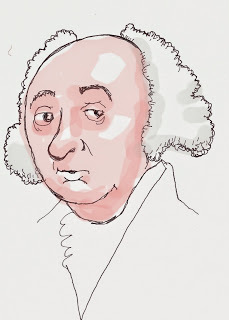 Another squeaker.
Another squeaker. Jefferson’s running-mate, Aaron Burr got the same number of electoral votes as Jefferson, so the House of Representatives had to decide who would be president: we only missed having a duelist as president by a procedural technicality. Instead we got another slave owner.
The Federalists – John Adams’ side – said Jefferson and the Democratic-Republicans 1 were a passel of radicals out to overthrow the country. George Washington himself said, "you could as soon scrub the blackamoor white, as to change the principles of a professed Democrat; and that he will leave nothing unattempted to overturn the Government of this Country." These days, of course, political figures don’t compare each other to “blackamores;” we’re too high-toned for that. We just stick to saying someone’s secretly Muslim.
As for the Democratic-Republicans, they claimed Adams was pro-British. Another sore point were the Alien and Sedition Acts which were sort of the Eighteenth Century version of Homeland Security. Homeland Security is a much nicer-sounding name, but we were a new country and weren’t as good at euphemisms in those days.
The Sedition Act made it an offense to write “scandalously” about the government or certain officials. Since the act was set to expire the day before Adam’s term ended, it wasn’t hard to guess who those certain officials were. One man was fined a hundred dollars for remarking he didn’t care if Adams got shot in the ass by a cannon.
The Alien and Sedition Acts also allowed the president to deport any resident aliens if the US were at war with their home country. This one’s still in effect, and it’s come in really handy, I can tell you, but these legislative accomplishments weren’t enough to keep Adams in for a second term. Burr’s support proved pivotal in swinging New York’s electoral votes into the Democratic-Republican camp.
Result
Thomas Jefferson: 73John Adams: 65
1. This was before bumper-stickers, and names didn't have to be as pithy.
Published on May 12, 2015 02:54
May 11, 2015
Presidential Losers #2: Thomas Jefferson
Who can ever forget Benjamin Harrison and James Polk? Their place in the pantheon of American statesmen is secure. This blog is to celebrate the also-rans and runners-up. The presidential losers.
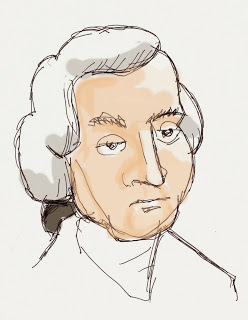 The United States’ first contested presidential election was a real nail-biter.
The United States’ first contested presidential election was a real nail-biter.
Thomas Jefferson and John Adams, once fast friends, had turned on each other. Standards of the time meant the candidates themselves had to refrain from open campaigning, but this did not apply to their supporters.
The Jefferson camp called Adams a "hideous hermaphroditical character, which has neither the force and firmness of a man, nor the gentleness and sensibility of a woman," and Adams’ supporters responded by calling Jefferson a “mean-spirited, low-lived fellow, the son of a half-breed squaw, sired by a Virginia mulatto father.” (The scandal over Jefferson’s affair with a slave did not surface until the next election.)
Although the Democratic-Republicans made a sound alliterative argument with “hideous hermaphroditical character,” thoughtful electors were evidently swayed by the question of whether Jefferson’s mother were indeed a half-breed squaw. That and the fact that all the New England states went to Adams was enough to decide the election.
But the political invective did nothing to cement the friendship between the two men, and since according to the procedures of the time, the runner-up Jefferson would end up being Vice President, the campaign must’ve made for prickly relations in executive branch.
Statesman, architect, writer of the Declaration of Independence and inventor of macaroni and cheese, Jefferson lost the election by a mere three electoral votes.
The Result
John Adams: 71Thomas Jefferson: 68
 The United States’ first contested presidential election was a real nail-biter.
The United States’ first contested presidential election was a real nail-biter. Thomas Jefferson and John Adams, once fast friends, had turned on each other. Standards of the time meant the candidates themselves had to refrain from open campaigning, but this did not apply to their supporters.
The Jefferson camp called Adams a "hideous hermaphroditical character, which has neither the force and firmness of a man, nor the gentleness and sensibility of a woman," and Adams’ supporters responded by calling Jefferson a “mean-spirited, low-lived fellow, the son of a half-breed squaw, sired by a Virginia mulatto father.” (The scandal over Jefferson’s affair with a slave did not surface until the next election.)
Although the Democratic-Republicans made a sound alliterative argument with “hideous hermaphroditical character,” thoughtful electors were evidently swayed by the question of whether Jefferson’s mother were indeed a half-breed squaw. That and the fact that all the New England states went to Adams was enough to decide the election.
But the political invective did nothing to cement the friendship between the two men, and since according to the procedures of the time, the runner-up Jefferson would end up being Vice President, the campaign must’ve made for prickly relations in executive branch.
Statesman, architect, writer of the Declaration of Independence and inventor of macaroni and cheese, Jefferson lost the election by a mere three electoral votes.
The Result
John Adams: 71Thomas Jefferson: 68
Published on May 11, 2015 03:31
May 10, 2015
Presidential Losers #1: John Hancock
What patriotic heart does not beat just a little faster at the mention of those immortals who led this great nation of ours: Garfield, Polk, Taylor. But what of the also-rans, the near-misses, and wannabes? In short, what of the losers? This blog shall honor those who sought the laurel of leadership, but won only the cabbage of loser-ship.
 Technically, the first election for the President of the United States wasn’t much of an election because George Washington ran unopposed. But John Hancock had already lost years before in 1775. when the Continental Congress selected the Commander in Chief for the Continental Army.
Technically, the first election for the President of the United States wasn’t much of an election because George Washington ran unopposed. But John Hancock had already lost years before in 1775. when the Continental Congress selected the Commander in Chief for the Continental Army.
People must’ve pretty much figured whoever led the army, assuming he didn't get himself killed, would someday also lead the country. Hancock, already President of the Congress, assumed the job would be his. John Adams records in his diary that Hancock had a big smirk on his face when Adams rose to give the nomination. Hancock and the Adams boys were tighter than a button-down shirt on a body builder, or at least they were up to that time.
Adams gave his speech, building up the man he was about to nominate with glowing praise, and when he got to the name, “George Washington,” Hancock looked like he’d just found a dead cat in his lap. Ever after that, Hancock’s star was pretty much on the decline. He did do the thing with the fancy signature, on July 4, 1776, signing the Declaration of Independence with the boast, “King George will be able to read this without his spectacles.” Except he never said that. He did sign on July 4, but that was just the copy they sent to the printer. He didn’t get around to putting on his fancy signature until August.
In 1788, knowing the presidency was out of reach, Hancock allowed his name to be put forth for Vice President. He got a measly four electoral votes, and not one of them from his own state of Massachusetts. Those had gone to John Adams, the man who’d done him dirty back in ’75.
The Result
George Washington: 69
John Hancock: 4
***
 Scoring Bertram Wiggly
now available on Audio! Free for new subscribers to Audible.com!
Scoring Bertram Wiggly
now available on Audio! Free for new subscribers to Audible.com!
 Technically, the first election for the President of the United States wasn’t much of an election because George Washington ran unopposed. But John Hancock had already lost years before in 1775. when the Continental Congress selected the Commander in Chief for the Continental Army.
Technically, the first election for the President of the United States wasn’t much of an election because George Washington ran unopposed. But John Hancock had already lost years before in 1775. when the Continental Congress selected the Commander in Chief for the Continental Army. People must’ve pretty much figured whoever led the army, assuming he didn't get himself killed, would someday also lead the country. Hancock, already President of the Congress, assumed the job would be his. John Adams records in his diary that Hancock had a big smirk on his face when Adams rose to give the nomination. Hancock and the Adams boys were tighter than a button-down shirt on a body builder, or at least they were up to that time.
Adams gave his speech, building up the man he was about to nominate with glowing praise, and when he got to the name, “George Washington,” Hancock looked like he’d just found a dead cat in his lap. Ever after that, Hancock’s star was pretty much on the decline. He did do the thing with the fancy signature, on July 4, 1776, signing the Declaration of Independence with the boast, “King George will be able to read this without his spectacles.” Except he never said that. He did sign on July 4, but that was just the copy they sent to the printer. He didn’t get around to putting on his fancy signature until August.
In 1788, knowing the presidency was out of reach, Hancock allowed his name to be put forth for Vice President. He got a measly four electoral votes, and not one of them from his own state of Massachusetts. Those had gone to John Adams, the man who’d done him dirty back in ’75.
The Result
George Washington: 69
John Hancock: 4
***
 Scoring Bertram Wiggly
now available on Audio! Free for new subscribers to Audible.com!
Scoring Bertram Wiggly
now available on Audio! Free for new subscribers to Audible.com!
Published on May 10, 2015 03:51
May 9, 2015
Scoring Bertram Wiggly Now in Audio
 When Bertram Wiggly leaves his job as an appliance actuary – calculating the life expectancy of major appliances so their warranties expire precisely one day before they implode – he thinks he’s found the perfect place to retire in Medville, with its town square, circled by brick-cobbled streets and quaint shops with bright red-and-white awnings.
When Bertram Wiggly leaves his job as an appliance actuary – calculating the life expectancy of major appliances so their warranties expire precisely one day before they implode – he thinks he’s found the perfect place to retire in Medville, with its town square, circled by brick-cobbled streets and quaint shops with bright red-and-white awnings. But then… the town rezones itself for musicals.
At any moment an invisible orchestra is apt to strike up a melody and the otherwise sane townsfolk of Medville burst into song. And not just song, either. Dance.
Against his will, Bertram finds himself in the midst of a musical comedy in which he has been cast as the comic curmudgeon.
Can Bertram defy Sam, the mysterious orchestra leader, and thwart the destiny laid out for him?
Hilariously narrated by Michael Gilboe, available FREE with Audible Trial or for a measly $6.08
Published on May 09, 2015 03:55



